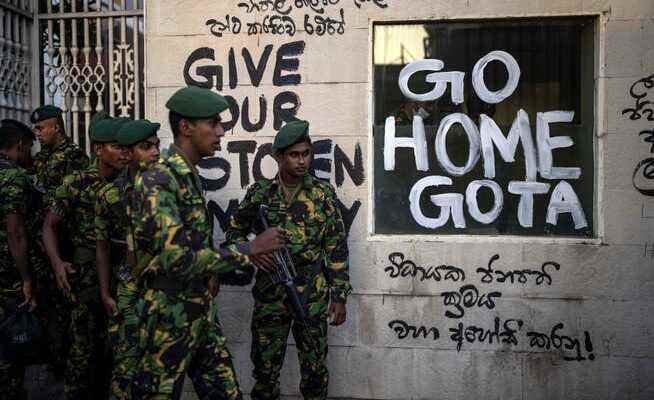The military was obviously not up for a coup. President Gotabaya Rajapaksa wants to defect abroad. The parties have little time to present a credible interim government.
Soldiers patrol near President Gotabaya Rajapaksa’s residence, which is still occupied by protesters.
Gotabaya Rajapaksa has not yet officially resigned as President of Sri Lanka. The unscrupulous politician would be capable of anything. Apparently, the former officer has tried to plan a bloody crackdown on the mass protests in recent days, despite announcing his resignation. The 73-year-old has a history of murder and dark intrigues to cement his family’s power. But this time he will not succeed.
The opponents have become too strong
Never before have so many people taken to the streets in Colombo as they did last weekend. Almost the whole country seems to be behind the protest camp. In order to use violence to suppress such a popular uprising – as happened in Myanmar last year – the president would have to rely on the absolute loyalty of the security forces.
Before Gotabaya Rajapaksa became President, he was Minister of Defense for over ten years. To the very end, he maintained very close contact with the heads of the armed forces and the secret service. But apparently they didn’t let themselves be harnessed for a coup. Unlike Myanmar, Sri Lanka has no tradition of military takeovers. In addition, the generals are well aware that it would have been impossible to rally the foot soldiers behind them in an attempted coup. Like the rest of the population, Sri Lankan soldiers and police officers and their families are suffering from high inflation and shortages in supplies.
Attempted escape by the President
Gotabaya Rajapaksa will have no choice but to resign. In order to avoid being arrested and charged with corruption or even more serious crimes, he apparently wants to leave the country first. According to reports, he and one of his influential brothers were prevented from leaving the country at Colombo airport on Tuesday. After that, they are said to have tried to get to a neighboring country, rumored to be the Maldives, on a naval ship.
It is hoped that Sri Lankans will finally get rid of the corrupt and incompetent clan that has controlled the island for nearly two decades. However, the devastating economic crisis is still a long way from being solved. The country needs a functioning government as soon as possible that can negotiate aid packages with the International Monetary Fund (IMF) and other donors.
To do this, the political parties would have to agree on an interim president with as broad a base as possible, but not only that. The protest camp will not give up until Prime Minister Ranil Wickremesinghe and other discredited government officials resign and new elections are announced.
Behind the scenes, however, the politicians are currently engaged in the usual undignified power struggles. Rajapaksa’s ruling party wants an interim president from its own ranks, as does the largest Sinhalese opposition party. The completely isolated prime minister dreams of becoming president, at least for a short while.
The country needs new politicians
Before the next elections, Sri Lanka needs one thing above all: a new political generation. There is a lot going on behind the scenes in this regard. Intellectuals, activists, human rights advocates and economists are calling for a change in political culture. These forces must be combined as quickly as possible and transformed into a credible political alternative.
The crisis also offers an opportunity for national reconciliation. In the recent protests, Sinhalese, Tamils, Muslims and Christians have united behind a cause for the first time since the end of the civil war. This momentum must be used to overcome simmering ethnic tensions.
The window of time is small and there is a great danger that the spirit of optimism will turn into hopelessness and frustration. However, the old political guard should be aware that they can no longer continue as before and that the next major wave of protests will hardly be as peaceful as the last one.
